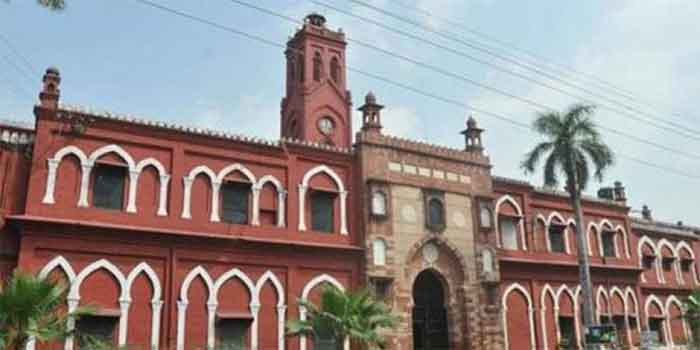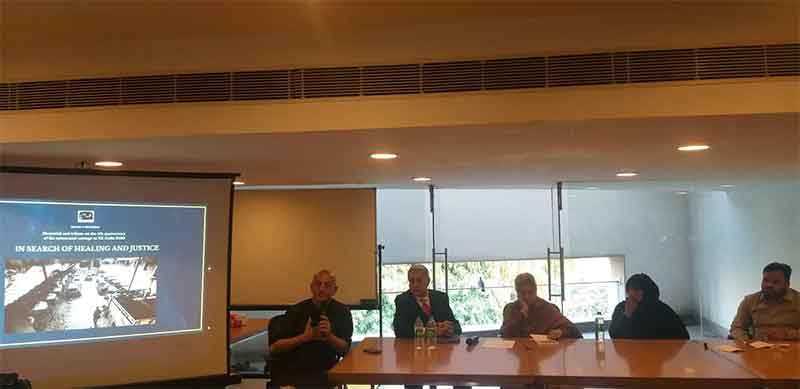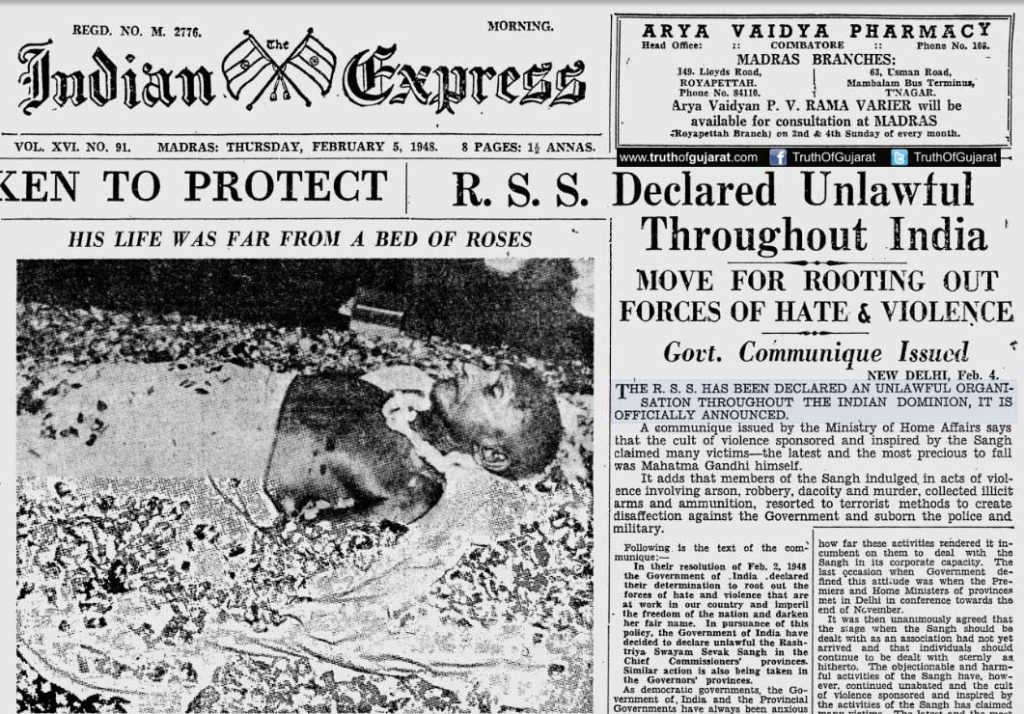
Aligarh city in Uttar Pradesh is known for two things – the Aligarh Muslim University (AMU) and the lock manufacturing industries. Aligarh is a university town, notable as the seat of AMU, which was founded here as Mohammadan Anglo Oriental College in 1975, initiating the Aligarh Movement. Sir Hamilton Gibb, who was an eminent Scottish Orientalist from England who taught at St. John’s College at Oxford and at Harvard University, had characterized the college as “the first modernist institution in Islam”.
Last week Aligarh appeared in Newspaper headlines for wrong reasons. Rubina Khan of Samajwadi Party, while alleging that UP government was targeting the Muslim community by asking for the ban of Azan (call for prayers) on loudspeakers, said that if Hindu activists recite Hanuman Chalisa at various crossings in the city, the Muslim women would read the Quran in front of temples. Rubina and her group of Muslim women supporters would to real justice to Islam and to their own lives, if they read Quranic verses with meaning in Urdu/Hindi to understand its content, they will understand that the word “Islam” stands for “peace” and not “confrontation”. Moreover, they will know what are their rights under Islam which their men often deny them on the ground of patriarchy. They will also learn that Quran ordains that woman should be given inheritance rights from the parental property, yet the Shariah Act, 1937, passed by Federal Assembly on the initiative of Muslims themselves in colonial India had exempted them from inheriting agricultural land. The shariah law had included a non-Islamic (Hindu) customary law to exempt women from inheriting agricultural property (under the pressure of Punjabi Muslim landlords/zamindars)! This exemption was contrary to Quranic precept of gender justice. While the Shariah Act meant to extend women’s property rights, it hardly served that purpose. Thus, the Act served the political purpose of affirming Muslim identity, without antagonizing the powerful Punjabi landlords. Though many state governments like Andhra Pradesh, Assam, Gujarat, Maharashtra, Tamil Nadu, and West Bengal later amended it to provide share in agricultural property to daughters and women, in reality they are not given their share. By reading Quran for themselves this group of Muslim women will realise that their economic rights are trumped by their men. The Samajwadi Party and their brigade of women will not contribute towards peace and communal harmony in the city of Aligarh; rather they will contribute to worsen the already fragile law and order situation in U.P.
Silence from AMU
The total silence displayed by intellectuals from AMU on the Rubina plans is regrettable. They are guilty of not condemning Rubina Khan’s political designs. It is time to heal the wounds of the community which is passing through difficult times due to Hindutva politics rather than further fuelling the fire of communal hatred and enmity. The students, teachers and intellectuals of AMU should have not only condemned Rubina’s plans to recite Quran in front of temples but should have appealed to Muslim clergy of the city to discontinue the practice of using loudspeakers for azan, if it can ensure peace and amity in the society. Like the founder of AMU, Sir Syed Ahmad Khan, they should adopt a rational approach to solve contemporary problems. Sir Syed had used rational approach to interpret the stories of the Quran. For instance, he interpreted that Prophet Muhammad did not ascend to heaven physically during Meraj, but his journey was spiritual and not physical. For this scientific and rational interpretation, he was proclaimed as Kafir/non-believer by clergy /religious scholars and even those from Darul Ulum, Deoband, Islamic seminary.
Hindu-Muslim Amity
Sir Syed Ahmad Khan (1817-1898) stood for Hindu-Muslim Unity during his whole life. For him MAO College (established in 1875), now Aligarh Muslim University (established in 1920), was undoubtedly Muslim but was not for Muslims alone. Hindus were welcome to join it as day scholars and boarders and were assured exemption from the rules and religious courses mandatory for Muslims. To win Hindu confidence Syed Ahmad forbade the slaughter of cows on the campus. It was interesting to note that in some of the early years of the college Hindu students even outnumbered Muslim ones. Sir Syed said “that Hindus and Mussalmans are equally entitled to get scholarships” in MAO College. When in 1882 some Muslim scholars of Amritsar offered a gold medal to a Muslim student who passed the B.A. examination in the first division, he immediately wrote to the Principal of MAO College: “I offer a gold medal from his own pocket to the Hindu student who may pass the next B.A. examination in the first division”. Late Prof. K.A. Nizami remarked in this regard that throughout his life, Syed Ahmad Khan stood for Hindu-Muslim amity and strove for the betterment of the Indian people as a whole.
Hindu-Muslim unity is also reflected in donations received from persons belonging to both communities. When the campaign for collecting funds for MAO College began, a large number of his Hindu friends contributed to it. The Rajas of Benaras, Vizyanaram and Patiala made generous contributions to the college fund. It is interesting to note that the Maharaja of Alwar donated in 1926 Rs. 8000/ per annum for five years to fund the Department of Theology, which teaches only Sunni and Shia theology. Raja Jai Kishan, the Prime Minister of Hyderabad and Mir Osman Ali Khan, the last Nizam of Hyderabad have made donations to the college.
Loudspeakers can be discontinued
The Muslim clergy and AMU community should appeal to their community to discontinue using loudspeakers for giving calls for prayers. It should be noted that loudspeakers were not invented during Prophet Mohammad’s time. They were first manufactured /invented in 1925. The Indian clergy were having a great debate in 1970s on the question: “whether loudspeakers should be used for Azan or not”. Many conservative believers then had said that its use is un-Islamic, as Shariah has not said anything about its use or non-use.
Today we live today in the age of human rights. Every individual, irrespective one’s religion, caste, colour, nationality or ethnicity or language is entitled to exercise his inalienable fundamental rights. The jurisprudence surrounding the theory of human rights has affirmed and reaffirmed that rights are not absolute and unlimited; they are subject to reasonable restrictions. In the exercise of his/her rights and freedoms, everyone shall be subject only to such restrictions as are determined by law solely for the purpose of securing due recognition and respect for the rights and freedoms of others and of meeting the just requirements of morality, public order and general welfare in a democratic society. Moreover, everyone has duties towards fellow citizens and towards other communities. In fact, rights and duties are two sides of the same coin.
As a citizen of secular India, one should have faith in the constitution, in the fundamental rights and the fundamental duties enshrined therein. Among the 11 fundamental duties under article 51A, three are most fundamental to ensure Hindu-Muslim unity and communal harmony. These are: (i) to uphold and protect the sovereignty, unity and integrity of India; (ii) to promote harmony and the spirit of common brotherhood amongst all the people of India transcending religious, linguistic and regional or sectional diversities….; and (ii) to develop the scientific temper, humanism and the spirit of inquiry and reform.
What Muslims should do?
The way out to the present-day controversies (like loudspeaker or the issues of Hijab in public places) deliberately raised by BJP and the members of Sangh Parivar in their mission to polarise Indian society for political gains can be countered by Indian Muslims with the spirit of tolerance and respect for religions of others. Indian Muslims should know that Indians were the first to give a liberal interpretation to women’s political rights, when Razia sultana was made queen of India in 13th century. This liberal interpretation was based on the fact that Quran does not explicitly prohibit a woman from becoming the head of the state. This was the main reason how Mrs. Benazir Bhutto became the first head of state in the entire Muslim world in 1980s. If the Indian Muslims can undertake to do the following two things, the BJP’s polarising strategies can be defeated.
First, Muslims all over India, after taking a rational and pragmatic view of the loudspeaker controversy, should decide to dismantle permanently loudspeakers from mosques. On 17 May 2022, the Minister of Islamic Affairs, Call and Guidance Sheikh Abullatif Bin Abdulaziz Al-Sheikh of Saudi Arabia issued a circular to all of the ministry’s branches in the Kingdom’s regions, instructing the employees in mosques to restrict the use of external loudspeakers to calling the faithful to prayer (Adhan). Furthermore, the volume must not exceed one-third of the full volume of loudspeakers. The minister warned that regulatory measures would be taken against anyone violating the circular. The circular stated that external loudspeakers harms patients, old people, and children in the houses in the vicinity of the mosques. Indian Muslims can go a step further and voluntarily remove speakers from mosques to dismantle BJP’s tool of making the issue political. Remember if Saudi Arabia, despite being Muslim majority state can restrict loudspeaker-noise, Indian Muslims should be more concerned about other religious groups, as India is a multireligious state. Since all the recitation of verses from Holy Quran during namaz/prayers are read in human voice, which does not disturb others, the call for prayers also should be given in low human voice.
Second, Muslim community should also reform some of their family laws to counter the issue of Uniform Civil Code (UCC) raised by BJP. They should come up with the idea to amend their marriage laws to introduce monogamy. Muslim countries like Tunisia have banned polygamy. BJP is raising the issue of UCC on the myth that majority of Muslims are having more than one wife. The census data invalidates this myth. According to census data polygamy is highest among Jains (who are construed as Hindus in Article 23 of the Indian constitution) and not among Muslims.
Though Islam does permit plurality of wives not exceeding four, it is only on the condition of strict equality of treatment among them. But the practice shows that this condition is not followed universally by majority of Muslims in the world. God warns in the Quran that “If you fear you will not be able to deal justly with them, then marry only one (emphasis added)” (Chapter 4, Verse 4). In another place, God cautions: “You are never able to be fair and just between women, even if it is your ardent desire” (Chapter 4, Verses 3 and 129). Polygamy is not a general rule, it is only a necessary and emerging provision for the preservation and fostering of high social values (involving marriages of widows or orphans) and for safeguarding society against promiscuity. This permission has undoubtedly been abused, but many Muslim States are seeking to eradicate such abuse through legal regulation of the institution of marriage. For instance, Egypt changed its marriage laws in 1920, 1923, 1929 and in 1956 it abrogated the Shariah courts.
In the similar vein, following the rational approach of Sir Syed Ahmad Khan, the present-day Indian Muslims should reinterpret Islamic laws to introduce gender justice. Such steps will counter BJP’s strategy of using or misusing religion for political gains.
Conclusion
By way of conclusion, it can be said that by tolerating Rubina Khan’s notorious decision to chant Quranic verses in front of Hindu temples with the endorsement of Samajwadi Party, Aligarh Muslims, particularly those from AMU, have proved wrong Sir Hamilton Gibb, who had considered the institute as the first modernist college in the Islamic world. Also, they have proved the words of Zakir Husain (a Bharat Ratna and the former President of India and an alumnus of Aligarh) one hundred per cent right as what he had said about AMU: “The way Aligarh [Muslim University] works, the way Aligarh thinks, the contribution Aligarh makes to Indian life will largely determine the place Musalmans will occupy in the pattern of Indian life”.
Abdulrahim P. Vijapur was Professor of Political Science in Aligarh Muslim University from 1998 to 2020. He worked as Chairman of its Department of Political Science, and Director of its Centre for Nehru Studies. Previously he was Visiting Professor in Human Rights Studies in JNU. He was an India Chair Professor at Carleton University, Ottawa, Canada (2013-14). As a Visiting faculty he also taught at South Asian University and Mumbai University. During 2005-2007 he was Professor, Ford Foundation Endowed Chair in Dalit Studies at Jamia Millia Islamia. During 1996-1999 he was Director, Centre for Federal Studies at Jamia Hamdard.
















































